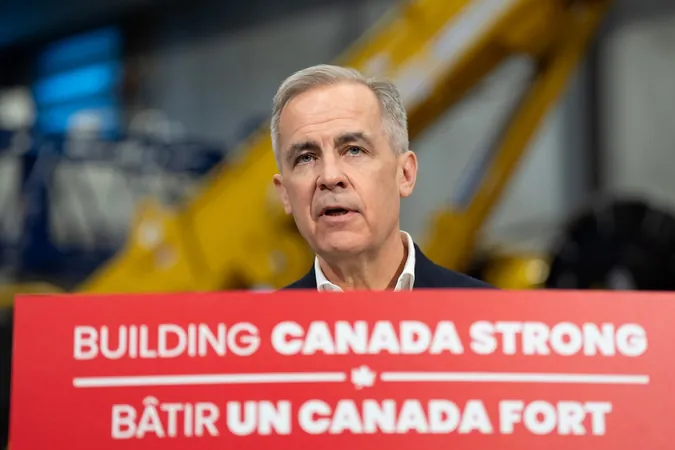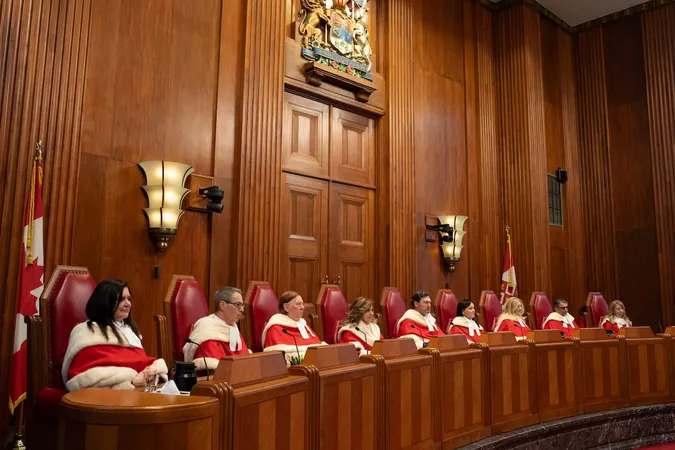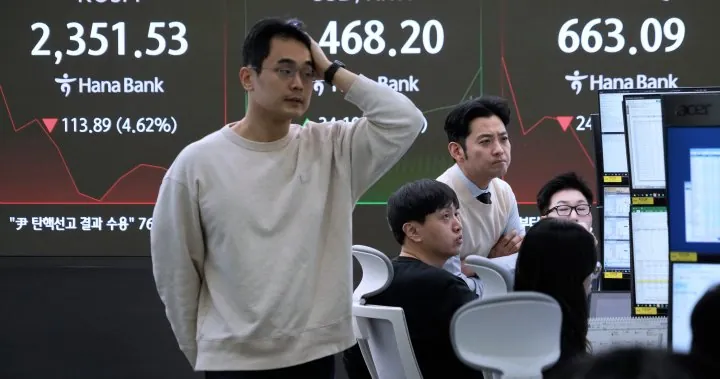
Mark Carney Draws Parallels Between Trade Wars and Brexit, Promises Economic Support for Canada
2025-04-05
Author: Benjamin
Introduction
In a striking campaign stop in Oakville, Ontario, Liberal Leader Mark Carney seized the opportunity to issue a warning about the economic repercussions of U.S. President Donald Trump’s tariff policies, likening them to the fallout of Brexit, which he closely monitored as the former governor of the Bank of England.
Economic Insights from Brexit
Carney, who held the distinguished position during the pivotal 2016 Brexit referendum, expressed that his experience has equipped him to navigate the intricacies of the current trade conflict. "The U.S. is harming itself with these tariffs. Similar to the Brexit effects, it takes time for these measures to filter through to the economy," he asserted, foreshadowing a potential weakening of the U.S. economy while emphasizing Canada's necessity to expand its trading partnerships.
Impact on Canada's Auto Sector
This week’s decision by the U.S. to impose reciprocal tariffs sparked significant concern, particularly affecting Canada’s auto sector. Carney addressed inquiries regarding measures to prevent job relocations from Canada to the U.S. amidst the mounting tariff pressures. He highlighted a productive dialogue with Ford CEO Jim Farley, reaffirming commitment to the Oakville manufacturing facility, which has been shuttered since last year for upgrades. "That plant will reopen; they’re committed to Canada," he confidently stated.
Interconnected Industry Challenges
The auto industry landscape is deeply interconnected in North America. Trump's tariffs have already forced Stellantis NV, another Canadian automaker, to halt operations at certain plants, leading to thousands of job losses across Canada, Mexico, and the U.S. In response, Ottawa matched these U.S. tariffs with a 25% duty on non-Canadian parts of American-made cars in accordance with the USMCA trade agreement, accumulating $60 billion in tariffs on a range of U.S. products.
Canada's Counter-Tariffs Strategy
Carney further indicated that Canada’s counter-tariffs aim to incentivize global manufacturers to sustain their production in Canada despite the challenges presented by U.S. trade policies.
Political Background and Strategy
As part of his campaign strategy, Carney’s team is emphasizing his robust background in central banking and his leadership in the private sector. Most recently, he stepped down as chair of Brookfield Asset Management, a major player in global investments, although this has raised flags with the Conservative Party regarding potential conflicts of interest tied to his investment strategies.
Opposition Criticism
Conservative Leader Pierre Poilievre has countered the Liberal narrative by questioning the fabric of Carney's experiences, insisting that mere credentials do not equate to an actionable plan. Carney retorted by critiquing Poilievre’s career as one that lacks real-world business acumen, positioning the Conservative leader as a "career politician."
Supporting Skilled Trades
Carney sought to bolster support for skilled trades, proposing an apprenticeship grant of up to $8,000 along with a commitment to double funding for the Union Training and Innovation Program. Meanwhile, competing campaign messages buzzed across the nation as Poilievre laid out plans to streamline bureaucracy, while NDP Leader Jagmeet Singh advocated for increased federal health transfers, pledging to ensure access to family doctors for all Canadians by 2030.
Conclusion
As the race heats up, voters are faced with contrasting visions for Canada's economic future. Amidst these high-stakes negotiations, the fate of countless jobs and industries hangs in the balance, with Carney positioned as a key player at the forefront of these pivotal discussions. Keep watching as the political dynamics continue to evolve!









 Brasil (PT)
Brasil (PT)
 Canada (EN)
Canada (EN)
 Chile (ES)
Chile (ES)
 Česko (CS)
Česko (CS)
 대한민국 (KO)
대한민국 (KO)
 España (ES)
España (ES)
 France (FR)
France (FR)
 Hong Kong (EN)
Hong Kong (EN)
 Italia (IT)
Italia (IT)
 日本 (JA)
日本 (JA)
 Magyarország (HU)
Magyarország (HU)
 Norge (NO)
Norge (NO)
 Polska (PL)
Polska (PL)
 Schweiz (DE)
Schweiz (DE)
 Singapore (EN)
Singapore (EN)
 Sverige (SV)
Sverige (SV)
 Suomi (FI)
Suomi (FI)
 Türkiye (TR)
Türkiye (TR)
 الإمارات العربية المتحدة (AR)
الإمارات العربية المتحدة (AR)